Outsourcing Rulemaking Powers
Constitutional limits and national safeguards
Format:Hardback
Publisher:Oxford University Press
Published:20th Jan '22
Currently unavailable, and unfortunately no date known when it will be back

Winner of the Frans Van Cauwelaert Prize 2022
Outsourcing Rulemaking Powers identifies the shared constitutional principles that determine the limits to the outsourcing of rulemaking powers. Through the examination of multiple countries, this book argues that there should be minimal legal safeguards to which all rules must heed, in particular those made by autonomous public or private actors.Within democratic states, parliaments have always been regarded as playing a pivotal role in the creation of rules. Through its composition, parliament represents the opinions and interests of society, which it serves through the legislative process. But in an increasingly globalized world, nation-states are confronted with issues that require international cooperation, expert knowledge and flexibility to resolve. Rather than taking the lead, parliaments are increasingly settling for a managerial position and have begun to outsource their rulemaking powers (and other constitutional responsibilities) rather than exercising them themselves. Outsourcing Rulemaking Powers identifies the shared constitutional principles that determine the limits to the outsourcing of rulemaking powers. It asks fundamental questions of its readers, such as: which powers should be outsourced? And to whom? What mechanisms are in place to guarantee the quality of the rules they make? Through the examination of multiple countries, this book argues that there should be minimal legal safeguards to which all rules must heed, in particular those made by autonomous public or private actors. Offering a bridge between traditional constitutional law and transnational private law, this book will be of interest to both practitioners and scholars within the global communities of comparative constitutionalism, global administrative law and transnational private law.
Outsourcing rulemaking power is common in many polities. It raises complex issues of constitutional principle and legal doctrine. Cedric Jenart's book is a valuable addition to the literature in this area. It examines in depth and from a comparative perspective the twin features that shape this area: the constitutional limits to outsourcing by the legislature and/or the executive; and the standards that must be complied with by actors outside the traditional governmental structure if outsourcing is allowed. * Paul Craig, Emeritus Professor of English Law, St John's College, Oxford, UK *
Complex and fragmented societies are faced with an overwhelming demand for the regulation of economic, social, environmental, and other problems. Rules, however, are set not only by parliament(s), but by a wide range of public and private standard setters. In his excellent piece of scholarship, Cedric Jenart covers the constitutional ground for this decentralised system of rulemaking across a number of jurisdictions. The book is a most welcome in-depth contribution to a Pan-European discussion about the function and the responsibilities of Parliaments in relation to other governance-capacities within modern societies. * Professor Dr. Florian Becker, LL.M., Institut für Öffentliches Wirtschaftsrecht, Christian-Albrechts-Universität zu Kiel, Deutschland *
Building on the rulemaking practices of the executive, Cedric Jenart argues for incorporating the regulatory activities of independent public agencies and private or semi-private institutions into modern public law. With a wealth of legal material and case studies, plus a fascinating look at the World Anti-Doping Agency, Jenart argues that such delegation can be justified in a democracy but should take different forms depending on their expected value: insulation from politics, the need for expertise, or stakeholder involvement. * Susan Rose-Ackerman, Henry R. Luce Professor Emeritus of Law and Political Science and Professorial Lecturer in Law, Yale University, USA *
Governments around the world increasingly delegate or “outsource” the power to make rules imposing obligations upon citizens, to public-private partnerships, purely private organizations, and NGOs, or absorb those organization's rules into public law. In this valuable contribution to comparative constitutional and comparative administrative law, Cedric Jenart gives us a comprehensive study of the limits principles of democracy and legality - as embodied in international and domestic law - place on outsourcing, delegation, and absorption reveals a surprisingly wide range of legal limits on an equally surprisingly range of practices. The concluding study of anti-doping regulations in sport provides an illuminating concrete example of why the question is important. * Mark Tushnet, William Nelson Cromwell Professor of Law emeritus, Harvard Law School, USA *
This book is the necessary stepping stone to produce theoretical, empirical and interdisciplinary work aimed at locating and controlling public power that is, often without political accountability structures in place, outsourced away from states. The state is indeed changing. To read Outsourcing Rulemaking Powers is key to making us make sense of it. * Mateus Correia de Carvalho, European Constitutional Law Review *
- Winner of Winner of the Frans Van Cauwelaert Prize 2022.
ISBN: 9780192897831
Dimensions: 270mm x 170mm x 24mm
Weight: 628g
314 pages